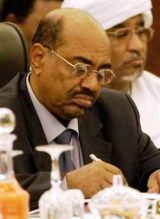African leaders reject non-African intervention in Sudan
TRIPOLI, May 17, 2005 (AP) — Seven African leaders meeting in the Libyan capital rejected Tuesday any intervention by a non-African nation in Sudan ‘s western Darfur region, and authorized Libyan leader Moammar Gadhafi to carry on trying to get conflicting parties to reach a settlement.

|
|
Sudanese President Lt. Gen. Omar el-Bashir attends the 3rd African summit to discuss the Sudan’s Darfur crisis late Monday night May, 16, 2005, in Tripoli, Libya. (AP). |
In a statement issued at the end of the two-day meeting, leaders of Egypt, Libya, Chad, Nigeria, Sudan , Gabon and Eritrea decided to “reject any foreign intervention in the Darfur problem and dealing with it should be through its African framework.”
The summit on Darfur was originally due to be held in Egypt but the venue was moved to Tripoli, where Gadhafi hosted Darfur rebel and local leaders last week.
Eritrean President Isaias Afwerki, invited to the summit by Gadhafi, met with Sudanese President Omar el-Bashir on Monday in what the official Libyan news agency described as a step toward a “historic reconciliation.” The two countries had accused each other of sheltering rebels their different territories.
The leaders called on other African nations to send more troops and police to reinforce the African Union’s mission in Darfur and asked the international community to contribute by extending logistical support.
The African Union has about 2,400 troops and 244 civilian police trying to restore the peace in Darfur. On April 28 it voted to increase the force to 6,171 military personnel and 1,560 police by the end of September.
The seven African leaders said they would support reconciliation efforts between the people of Darfur, pay compensation and “try crime suspects in Darur according to the national judicial system.”
Sudan ‘s government strongly rejected a U.N. Security Council resolution adopted in March calling for the trial of Darfur war crimes suspects before the International Criminal Court. El-Bashir vowed last month not to allow any Sudanese national to be tried abroad.
In their closing statement the leaders called on the warring parties to resume peace talks in Abuja, Nigeria before the end of this month and asked the African countries involved in the Tripoli summit to send high ranking delegates to the talks to help.
The Darfur conflict erupted after a rebel uprising against what is seen by many in the vast western province as years of state neglect and discrimination against Sudanese of African origin. Sudan ‘s government is accused of responding with unleashing and supporting the Janjaweed, an Arab militia that committed wide-scale abuses against the African population.
The U.N. estimates 180,000 people have died since violence broke out in Darfur in February 2003, mainly from war-induced hunger and disease.
